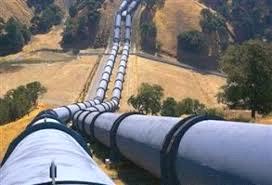Ammon News - AMMONNEWS - Iraq has returned to long-mooted plans to build an oil export pipeline from Basra to the Jordanian port of Aqaba. Despite Daesh’s foothold having diminished, obstacles remain. Callum Cyrus investigates
Baghdad is pushing ahead with infrastructure investments to lift its crude export capacity, having stemmed the advances made by Daesh in the north and west of the country.
The government wants to raise crude output to 6 million bpd by 2020, from around 4.4 million bpd in February, to help fund Iraq’s economic recovery from the impact of war.
However, Baghdad has struggled to lift crude exports via Al-Basrah Oil Terminal (ABOT) in Basra and through the autonomous Kurdistan region in the north.
Disputes about production shares with the Kurdistan Regional Government (KRG) suspended liftings from key northern fields, while Daesh’s foothold made it impossible to construct cross-country pipeline routes.
Over the last year, however, Iraqi forces have pushed back the Daesh tide, with IHS’ Conflict Monitor projecting that the militant group will retreat from Mosul before the second half of this year. As such, attention is now returning to the expedition of infrastructure projects to bolster Iraq’s oil export capabilities.
Preliminary bids have been invited for a route into Jordan, and Baghdad says exports are already benefiting from upgraded facilities at ABOT.
But these plans could still be thwarted should the security situation deteriorate, and Baghdad has been forced to change the route of a planned pipeline to Jordan to avoid disruption by insurgent forces in Anbar Province.
Hemmed in
In 2013, Iraq shortlisted 12 contractors to build the US$18 billion Basra-Hadith-Aqaba pipeline. The 1 million bpd project will help tap the Jordanian market for Iraq’s crude production, by directly piping 150,000 bpd of oil to Jordan’s Zarqa refinery, with the remainder re-exported further afield via the port of Aqaba.
The struggle against Daesh slowed these plans, though, as militants were entrenched throughout western Iraqi territory along the route of the conduit.
However, on April 11, Baghdad announced that Daesh now held less than 30,000 square km of Iraqi territory, a major reduction from the 40% the group controlled at the height of its influence in 2014.
Jordan route resurfaces
With the security situation becoming more stable, Baghdad has again been able to pursue upgrade projects that would help ramp up business for Iraqi crude once OPEC’s supply cap lapses.
The link to Jordan resurfaced in December 2016, when the State Company for Oil Projects (SGOP) announced it had again invited preliminary bids. Work on the first phase is now scheduled to begin in 2018, with launch slated for 2020.
The initial phase will include engineering, procurement, construction (EPC) and financing of pipelines linking the Basra fields to a connection near Najaf in central Iraq.
On April 2, Iraq announced an agreement with Jordan on the pipeline project after talks held in Amman. Iraqi officials said they anticipated all the formalities for the development would be completed within two months.
But the spectre of Daesh still threatens Baghdad’s plans, and the government is continuing to try to mitigate the risk of extremist attacks.
As such, SGOP has announced that the Basra-Aqaba will no longer pass via the Haditha pumping station in Anbar Province, to avoid Daesh-held areas in the western desert region.
It will still run through the province, but terminating the initial phase at Najaf will delay construction to the west in the apparent hope that Daesh is pushed back further in the meantime.
Other projects
Other upgrade projects are being rolled out to support exports, underscoring growing confidence in light of Daesh’s diminished presence.
Earlier this month, Jordanian maritime experts were quoted by Iraq TradeLink as saying that the port of Aqaba had been fitted with piers that can handle oil and LNG exports.
On the Iraqi side, Minister of Oil Jabbar al-Luaibi has been cited as saying upgrades at Basra would support an “unprecedented increase of oil production”.
In February, Baghdad announced it had signed a memorandum of understanding (MoU) with Tehran to consider a new pipeline connecting the northern Kirkuk oilfield with Iran.
Talks also resulted in an undertaking to establish joint commissions over disputes concerning shared oilfields, and to consider possible shipments of Iraqi crude to Iran’s Abadan refinery in Khuzestan Province.
What next?
In NBI’s view, recent developments momentum is returning to Baghdad’s infrastructure push, which is seen racking up a bill of US$50 billion for all planned upgrades.
Starting work on the Jordanian pipeline route would provide a major confidence boost for Baghdad and prove that Iraq is capable of arranging export expansions after years of militant disruption. Once completed, pipelines to Jordan and Iran would provide new outposts for crude produced in both the Kurdistan region and elsewhere in Iraq.
This may help the Iraqi sector ramp up output in the years ahead, once global oil markets recover and OPEC ends its cap on production.
Baghdad must still exercise caution over the Basra route, however, to ensure that the link does not fall prey to Daesh militants further down the line. Averting serious interruptions will be crucial.
*MEOG








 comment replay
comment replay 